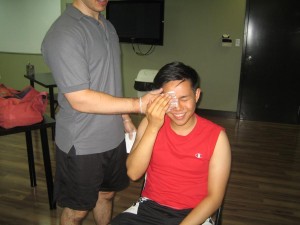Hyphema involves the accumulation of blood within the anterior compartment of the eye. The blood might cover most or the whole iris and pupil which can disrupt vision partially or completely.
The condition is usually painful and if not treated, it can result to lasting visual issues. Hyphema is generally brought about by eye trauma that is accompanied by increased intraocular pressure. Nevertheless, it might arise without warning among children who have other medical ailments such as hemophilia or sickle cell anemia.

Prompt medical care is required if hyphema arises. The ideal way to prevent the condition is to use eye protection during sports. Additionally, any eye injury should not be taken lightly. Even if bleeding is not present, the eye should be assessed by a doctor.
Indications
The indications of hyphema include:
- Pain
- Evident blood in the front region of the eye
- Light sensitivity
- Cloudy, blurred or blocked vision
- Blood might not be present if the hyphema is small
What are the possible causes of a hyphema?
The usual cause of hyphema is trauma to the eye, typically from a fall, sports injury or accident at home or in the workplace. It can also be caused by the following:
- Eye infection by the herpes virus
- Abnormal blood vessels on the surface of the iris
- Issues with the intraocular lens
- Blood clotting issues such as sickle cell anemia and hemophilia
- Eye cancer
Management
For a mild case of hyphema, it can heal on its own within a week. The pain can be managed using over-the-counter pain medications that do not include aspirin. Remember that aspirin must be avoided since it thins out the blood and increase bleeding.
The doctor will decide on how to properly manage the condition based on various factors such as severity of the injury, age, medical history, overall health, tolerance of specific drugs and personal preference.
The doctor might choose from the following treatment options:
- Bed rest
- Eye drops such as steroid drops to reduce inflammation and/or dilating drops to ease the pain
- Patch that is worn over the affected eye
- Daily monitoring of the eye pressure
- Reducing the eye movement by avoiding reading or watching TV
- Elevate the head to at least 40 degrees while sleeping
More Information / Disclaimer
The information posted on this page on hyphema is for learning purposes only. Learn to recognize and manage eye issues by taking a standard first aid course with Mississauga First Aid.
